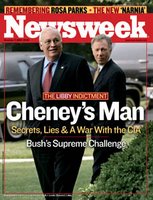 [[P O L L S]] * This weekend’s TV talk shows all seem to be sporting the same predictable theme: How can George W. Bush restore his presidency, following a season of Republican and administration foul-ups, misjudgments, and criminal indictments? In the short term, the best the prez can hope for is to at least improve his standing among his dispirited conservative base by picking a third Supreme Court nominee who is closer to their hearts than Harriet Miers. (Two names already mentioned: Judges Samuel Alito of New Jersey and J. Michael Luttig of Virginia, both of whom have abortion-related decisions on the record and might present large targets for Democrats hoping for a more moderate pick.) But in the long run, his task of revitalizing a scandal-ridden White House that many voters now see as best neutered might be harder than pundits think.
[[P O L L S]] * This weekend’s TV talk shows all seem to be sporting the same predictable theme: How can George W. Bush restore his presidency, following a season of Republican and administration foul-ups, misjudgments, and criminal indictments? In the short term, the best the prez can hope for is to at least improve his standing among his dispirited conservative base by picking a third Supreme Court nominee who is closer to their hearts than Harriet Miers. (Two names already mentioned: Judges Samuel Alito of New Jersey and J. Michael Luttig of Virginia, both of whom have abortion-related decisions on the record and might present large targets for Democrats hoping for a more moderate pick.) But in the long run, his task of revitalizing a scandal-ridden White House that many voters now see as best neutered might be harder than pundits think.Consider the results of a new Washington Post-ABC News survey, conducted following the indictment on Friday of Dick Cheney’s former chief of staff, I. Lewis “Scooter” Libby, for his role in the CIA leak scandal. It shows that 55 percent of Americans believe Libby’s alleged misdeeds are suggestive of more widespread “ethical wrongdoing” by the Bush White House. (Just 41 percent insist it was an “isolated incident.”) Almost 70 percent of respondents consider the charges brought against Libby by special prosecutor Patrick J. Fitzgerald to be “serious.” Forty-seven percent are convinced that Bush political adviser Karl Rove is implicated nefariously in the case, with a fifth of respondents sure that he acted illegally in some manner. And a slightly smaller proportion--41 percent--believe Cheney did something wrong, as well, in relation to the “outing” of CIA agent Valerie Plame.
Meanwhile, 46 percent of respondents contend that “the level of honesty and ethics in the government has declined rather than risen under Bush.” (So much for Bush’s long-ago vow to “restore honor and decency to the Oval Office.”) That’s three times the number of people who say that the Bush administration is synonymous with integrity. As the Post reports, “Barely a third of Americans--34 percent--think Bush is doing a good job ensuring high ethics in government, which is slightly lower than President Bill Clinton’s standing on this issue when he left office.”
With the likelihood of a Libby trial running through the next year (unless Bush follows his father’s example in the Iran-Contra scandal, and pardons Scooter), and the expectation that Rove will himself face indictments at some future date, the prez might well spend the final 39 months of his presidency trying to swat away the cloud of ineptitude and failure that has already gathered about him. And that cloud has the potential still to grow darker. As New York Times columnist Frank Rich opines this week, “To believe that the Bush-Cheney scandals will be behind us anytime soon you’d have to believe that the Nixon-Agnew scandals peaked when G. Gordon Liddy and his bumbling band were nailed for the Watergate break-in.” As with Liddy’s break-in, Libby’s indictment might be nothing more than the opening act in a political drama destined to expose the truths regarding Bush’s rush to war against Iraq, and bring down Bush in the same way that Watergate spelled the end for Richard Nixon. If so, the Post-ABC poll suggests that Americans won’t be at all surprised.
ADDENDUM: It isn’t only Bush’s integrity that is being called into question these days. A new AP/Ipsos poll finds nearly half of the respondents--45 percent--saying that Congress is lax these days when it comes to upholding standards of ethics and honesty. (Another 21 percent rate congressional ethics as neither good nor poor.) With the Republican heads of both houses under investigation for ethical lapses, these findings are really no surprise. However, doubts surrounding the rationale behind the bloody Iraq war, news reports about “pork-filled” spending bills, and skyrocketing government budget deficits might also figure into Americans’ declining opinions of Congress. The question now is, can Democrats exploit the unpopularity of the Republican-dominated legislative branch in next year’s midterm elections?
READ MORE: “A Time to Regroup,” by Nancy Gibbs and Mike Allen (Time); “Flying Blind,” by Howard Fineman and Richard Wolffe (Newsweek); “Besieged Bush Faces Attacks from Friends as Well as Foes,” by Paul Harris (The Observer); “After Upheavals, President Seeks to Steady Course,” by Richard W. Stevenson and Robin Toner (The New York Times); “Buffeted With Problems, Bush Must Chart a Recovery,” by Dan Balz (The Washington Post); “Rove Is a Cancer on the Presidency,” by Lawrence O’Donnell (The Huffington Post); “Our 27 Months of Hell,” by Joseph C. Wilson IV (Los Angeles Times); “Libby Takes the Fall,” by Joe Conason (Salon); “The Wall Street Journal Strikes Again” (The Anonymous Liberal); “‘More Than a Body Blow,’” compiled by J.J. Helland and Juliana Bunim (Salon); “Stop the Campaigning,” by Lewis L. Gould (The Washington Post); “As Bush Is Trapped By Ethics, His Base Will Trap Him,” by Steve Soto (The Left Coaster); “America Can Do Better,” by Al From and Bruce Reed (Blueprint).







No comments:
Post a Comment